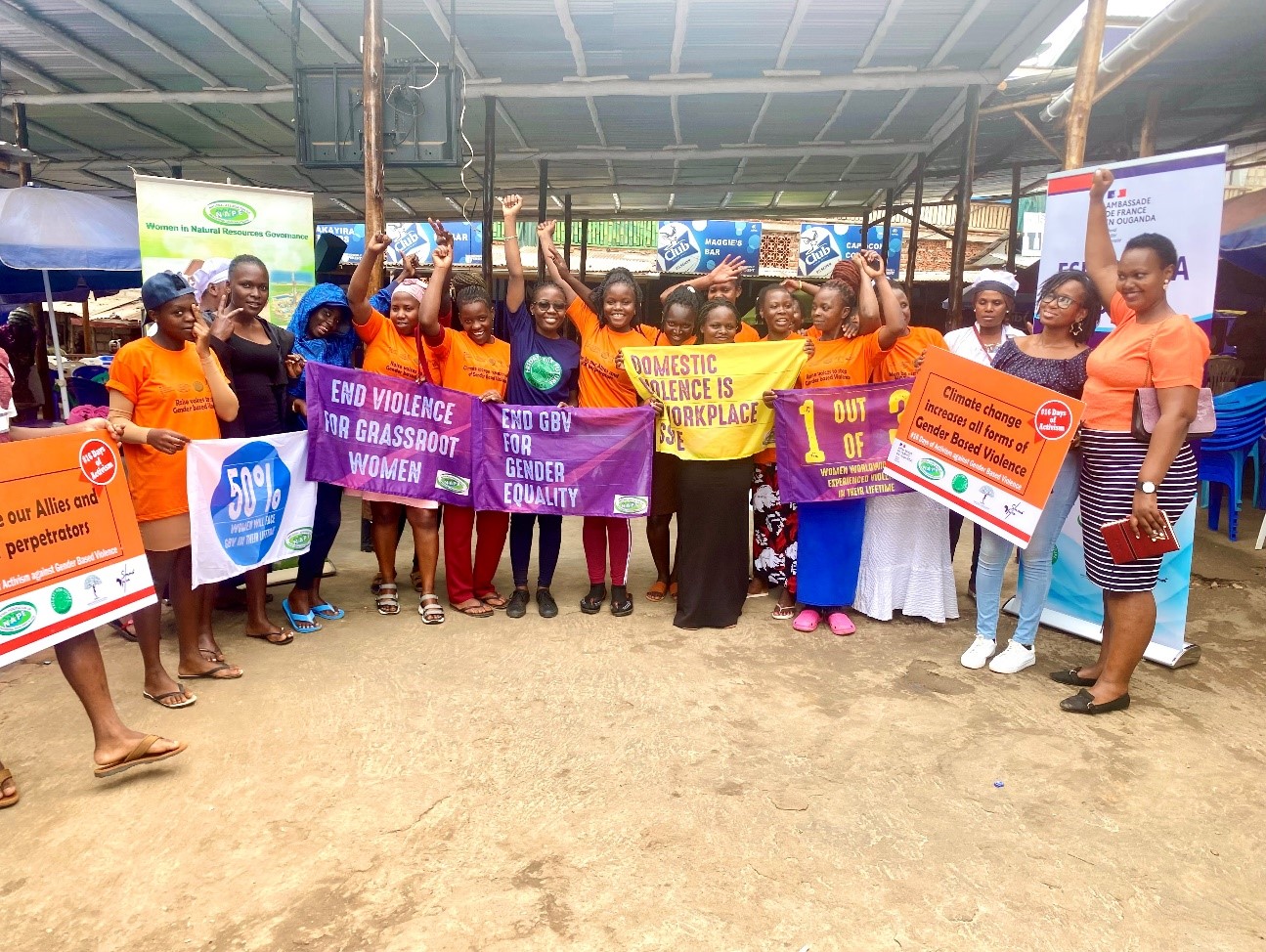Tuesday, December 13th, 2022 | By

On 25th November 2022, Uganda joined the rest of the world in 16 Days of Activism against Gender-Based Violence. The campaign kicks off on International Day of Elimination of Violence against Women and runs till December 10th, the Human rights day.
National Association of Professional Environmentalists (NAPE) in collaboration with other partners participated in the campaign with grassroots women, rising awareness on how climate change contributes to gender based violence and how women can spearhead the fight against all forms of gender based violence.
NAPE held two awareness raising meetings; one for women from oil-rich districts in Hoima, Kikuube, Buliisa, Amuru and Nwoya who are affected by oil extractives and large plantations which was held in Hoima district; and another with the fisher folk in the suburbs of Munyonyo landing site.
During the meeting in Hoima, the women stressed that women and girls are largely impacted by the effects of climate change since they are more reliant on natural resources to support their livelihoods.
“Like in Amuru, there has been abnormal rainfall affecting the crops in the garden. This is already causing violence in families due to economic hardships and looming food insecurity since we largely depend on agriculture for our livelihood,” said Owek Jenifer from Amuru district.
“Floods in Buliisa district have caused displacements fuelling gender based violence. Young girls in areas hardly hit by floods have dropped out of schools and married off at a young age while women have been left with the burden of sole responsibility of the children. Besides that, drought affects the districts and it leaves cattle dead and crops dried up leading to economic hardships and food insecurity. These heavily affect women,” said Ms.Elinah Kaahwa from Buliisa.
However, the women said they are determined to stand up together and find solutions for sustainable development and overcoming the challenges. The women also call on government to implement punitive measures that apprehend GBV perpetrators.
“We need to work together to improve our sources of income so that we can educate our children, we highly depend on natural resources because we did not go to school to get better jobs. We also need to engage in making charcoal briquettes and energy saving stoves to reduce risks that women and girls face while walking long distances to look for firewood and water,” said Christine Nyangoma from Hoima.
The meeting at Munyonyo landing site was organised by NAPE together with SIMMA Africa for Creative Arts, Girls for Climate Action and Fridays for Future Uganda who are jointly implementing PISCCA project, “Towards an Intergenerational and Creative Feminist Movement in Uganda” with support from French Embassy under Gender and Climate coalition.
The fisher folk noted that climate change accelerates Gender Based Violence within the fishing communities when they don’t catch enough. The women noted that the biggest challenge is fellow women not supporting victims and looking at them as the cause of violence based on their dress code.
They also noted how the fish catchment has reduced which causes physical fights at the landing site as they struggle to get what to sale and be able to fend for their families. The girls that work in the bars expressed how they are unsafe due to the nature of their job and how men think that by virtue of doing the job they have consented to all forms of sexual advances whereas not and yet their bosses think this should be fine with them.
“Men need to be sensitized as change agents for gender based violence since they are the perpetrators and degraders of the environment,” said a fish vendor at Mulungu landing site.
Joan Akiiza, the senior Gender and legal affairs officer at NAPE noted that gender issues are magnified when climate crisis occurs, as women face the burden of increasing household responsibilities and are vulnerable to domestic and sexual violence.
She called upon women and girls to raise their voices and report all cases of GBV to police she shared with them a hotline to dial and report cases without suffering in silence to stop all forms of gender based violence that affect women and girls.
Copyright ©2025 Community Green Radio . All Rights Reserved. Designed : Lwegatech